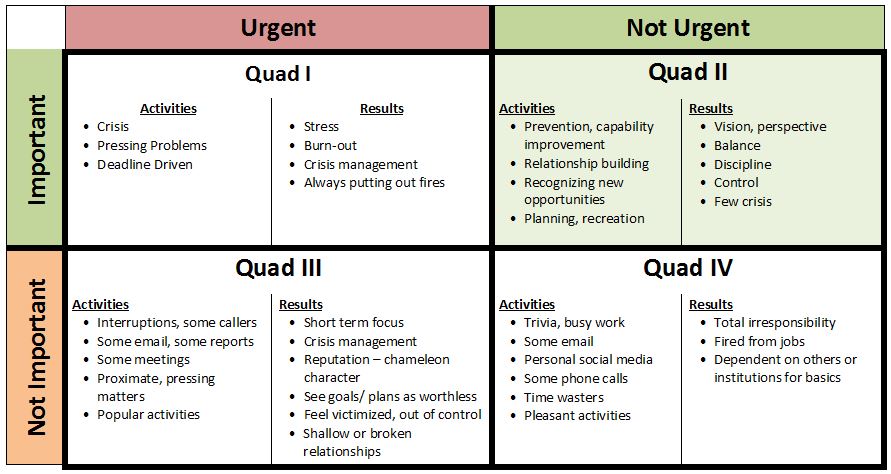The 7 Seven Habits of Highly Effective People
By Stephen Covey (1989)
If you don’t let a teacher know what level you are—by asking a question, or revealing your ignorance—you will not learn or grow.
… knowing I need to listen and knowing how to listen is not enough. Unless I want to listen, unless I have the desire, it won’t be a habit in my life.
My Notes
1. Be Proactive
“The ability to subordinate an impulse…”
If we live like animals, out of our own instincts and conditioning and conditions, out of our collective memory, we too will be limited.
Focus on things in your control—Circle of Influence. Reactive people “focus their efforts in the Circle of Concern.”
Be a light, not a judge. Be a model, not a critic. Be part of the solution, not part of the problem.
2. Begin With the End in Mind
It is possible to be busy—very busy—without being very effective.
If the ladder is not leaning against the right wall, every step we take just gets us to the wrong place faster.
In the words of both Peter Drucker and Warren Bennis, “Management is doing things right; leadership is doing the right things.”
If you’re work-, possession-, pleasure-, friend- or enemy-centred… your feelings of self worth depend on the situation, on others… on things you can’t control.
In the face of difficult decisions, be ready:
- Make a choice, independently, based on your values/principles
- Your relationships allow you to communicate these choices
3. Put First Things First
Quadrant II is the heart of effective personal management. It deals with things that are not urgent, but are important. It deals with things like building relationships, writing a personal mission statement, long-range planning, exercising, preventive maintenance, preparation…

4. Think Win-Win
Confrontation takes considerable courage, and many people would prefer to take the course of least resistance, belittling and criticizing, betraying confidences, or participating in gossip about others behind their backs. But in the long run, people will trust and respect you if you are honest and open and kind with them. You care enough to confront. And to be trusted, it is said, is greater than to be loved. In the long run, I am convinced, to be trusted will be also mean to be loved.
If a person can express his feelings and convictions with courage balanced with consideration for the feelings and convictions of another person, he is mature, particularly if the issue is very important to both parties.
… remember that no deal is always an option. Or you may occasionally choose to go for the low form of win-win—compromise.
5. Seek First to Understand, Then to Be Understood
“Well, why don’t you make an effective presentation?” I asked.
“I did,” was the reply.
“How do you define ‘effective’? Who do they send back to school when the salesman doesn’t sell—the buyer? Effective means it works; it means P/PC. Did you create the change you wanted? Did you build the relationship in the process? What were the results of your presentation?”
“I told you, he didn’t do anything. He wouldn’t listen.”
“Then make an effective presentation. You’ve got to empathize with his head. You’ve got to get into his frame of mind. You’ve got to make your point simply and visually and describe the alternative he is in favor of better than he can himself. That will take some homework. Are you willing to do that?”
“Why do I have to go through all that?” he asked.
“In other words, you want him to change his whole leadership style and you’re not willing to change your method of presentation?”
“I guess so,” he replied.
“Well, then,” I said, “just smile about it and learn to live with it.”
6. Synergise
Synergy means that 1 + 1 may equal 8, 16, or even 1,600.
… the very strength of the relationship is in having another point of view.
When someone disagrees with you, you can say, “Good! You see it differently.”
7. Sharpen the Saw
Suppose you were to come upon someone in the woods working feverishly to saw down a tree.
“What are you doing?” you ask.
“Can’t you see?” comes the impatient reply. “I’m sawing down this tree.”
“You look exhausted!” you exclaim. “How long have you been at it?”
“Over five hours,” he returns, “and I’m beat! This is hard work.”
“Well, why don’t you take a break for a few minutes and sharpen the saw?” you inquire. “I’m sure it would go a lot faster.”
“I don’t have time to sharpen the saw,” the man says emphatically. “I’m too busy sawing!”
